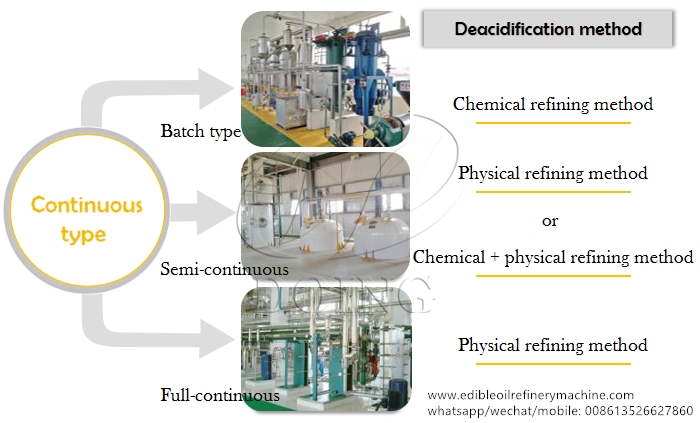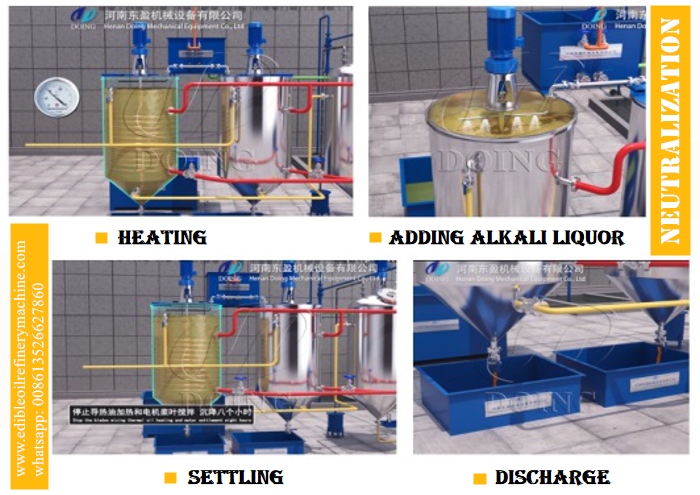

What are the deacidification methods for oil refining?
FAQ / Chat on line / Give me a price / Date:November 27, 2024
The deacidification methods of oil refining mainly include physical deacidification and chemical deacidification. General physical deacidification is used by steam distillation, and chemical deacidification is used by alkali refining.
(1)Physical deacidification method
·Steam distillation deacidification: This method uses high-temperature steam to remove free fatty acids in the oil under high temperature and vacuum conditions. This method is suitable for refining low-colloid oils, such as coconut oil and rice bran oil, because these oils have a high acid value. If chemical alkali refining is used for deacidification, it will cause excessive loss of neutral oil.
 Different types of refining method in edible oil refining process
Different types of refining method in edible oil refining process
(2)Chemical deacidification method
·Alkali refining deacidification: This is the most commonly used chemical deacidification method. The caustic soda solution is used to neutralize the free fatty acids in the crude oil to generate sodium soap that precipitates in the oil and then separates from the oil. This method can remove most of the free fatty acids, and the generated sodium soap has a good adsorption effect, which can adsorb and remove other impurities in the oil, such as pigments, phospholipids, etc.
 Chemical deacidification process of cottonseed oil
Chemical deacidification process of cottonseed oil
(3)Advantages and disadvantages of different methods
·Physical deacidification: The advantages are simple operation and no wastewater discharge, which is suitable for refining low-colloid oils. The disadvantage is that the deacidification effect may not be as thorough as the chemical method.
·Chemical deacidification: The advantage is that the deacidification effect is good and most of the free fatty acids and other impurities can be removed. The disadvantage is that it may cause the loss of some neutral oils and may lead to the loss of some nutrients.
(4)Application scenarios and scope of application:
·Physical deacidification: Suitable for low-colloid oil refining, such as coconut oil, rice bran oil, etc.
·Chemical deacidification: Suitable for most oil refining, especially for scenarios where free fatty acids need to be removed efficiently.
By combining different deacidification methods, oil mills can choose the most suitable process according to specific needs to achieve the best refining effect and economic benefits.
contact us
Kindly leave your message in below form. Our engineer will contact you ASAP once we got your message.
- QDo you want to buy machine?
- Yes, I want to buy machine.
- No, I want to learn more in advance.
- QWhat oil seeds do you want to process?
- Palm fruit
- Palm kernel/nut
- Peanut/Groundnut
- Soybean/Soya bean
- Sunflower seed
- Cottonseed
- Rapeseed/Canola
- Dried coconut
- Rice bran
- Corn germ
- More than two oilseeds:
- Other:
- QHow many tons palm fruit bunches will you process per day?
- 1-10 tons per day
- 10-30 tons per day
- 30-50 tons per day
- 50-100 tons per day
- QWhat machine do you want?
- Palm oil presser
- Other single machine (thresher, clarification tank, vibrating screen, filter...)
- Palm oil pressing line (from FFB to crude oil)
- Palm oil refining line (to produce refined, bleached, deodorized oil)
- Palm oil bottling / filling line
- QWhat machine do you want?
- Palm oil pressing line (from FFB to crude oil)
- Palm oil refining line (to produce refined, bleached, deodorized oil)
- Palm oil bottling / filling line
- QHow many tons oil seeds will you process per day?
- 1-20 tons per day
- 20-50 tons per day
- 50-100 tons per day
- QWhat machine do you want?
- Oil presser
- Other single machine (cracker, crusher, roaster, filter...)
- Oil pressing line (from seeds to crude oil)
- Oil refining line (to produce refined, bleached, deodorized oil)
- Oil bottling / filling line
- QWhat machine do you want?
- Oil presser
- Oil pressing line (from seeds to crude oil)
- Oil solvent extraction line
- Oil refining line (to produce refined, bleached, deodorized oil)
- Oil bottling / filling line
- QWhat machine do you want?
- Oil pressing line (from seeds to crude oil)
- Oil solvent extraction line
- Oil refining line (to produce refined, bleached, deodorized oil)
- Oil bottling / filling line





